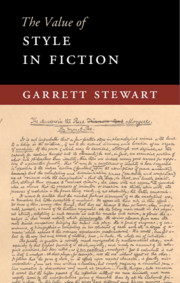Book contents
3 - Stylistic Microplots: Melville to Miéville
Published online by Cambridge University Press: 01 June 2018
Summary
In thinking about style, one is always starting over – with fresh evidence. Freshness, surprise, being often the point. And this can mean beginning, as in this chapter, with endings. Weighed in the balance of imagined action, the value of style can tip the scales in a novel's last moments. Even in verbally adventurous fiction, however, one cannot fully anticipate, early on, the degree of fireworks or fade-out that will be assigned to closure. Style earns its way as it goes, and dividends may be paid – and played – out in many forms. Plot can achieve its vanishing point in a dense horizon of rhetoric or taper off in understatement, closure secured either in the midst of verbal intensity or its wake. Only the narrative's particular verbal journey can set the terms of understanding for its point of rest.
Certainly no novel ever muted its way toward conclusion less than Herman Melville's Moby Dick (1851). Ahab's Pyrrhic victory is complete, the revenge of the whale's death taking the ship down with it. An unattributed choric voice, variant of free indirect discourse, transmits the last human remark: “The ship? Great God, where is the ship?” The answer soon comes into visual focus across the phonic and syntactic interference at “they through”: “Soon they through dim, bewildering mediums saw her sidelong fading phantom.” In a minimally distended periodic suspension of that four-word impedance (“through dim, bewildering mediums,” with dimness inherent [“dim”/“dium”] in the ocean mists and spray), the combined work of assonance and a further hint of chiastic syllabification (“dim”/“med”) postpones revelation from “Soon they,” across “through,” to the verb “saw,” followed by a sideways elongation of spectral alliterative modification in that “sidelong fading phantom.” In this brief adjective chain, the pressure of alliteration is only a further horizontal nudge from the normal comma separation after “dim” to the almost adverbial force of “sidelong.” And in all this, the point of vantage is a satellite craft soon to be sucked down with that ghostly vestige of the ship in a more aggressive whirlpool of phonetic recurrence: “And now, concentric circles seized the lone boat itself, and all its crew, and each floating oar, and every lance-pole …” (576).
- Type
- Chapter
- Information
- The Value of Style in Fiction , pp. 70 - 100Publisher: Cambridge University PressPrint publication year: 2018

